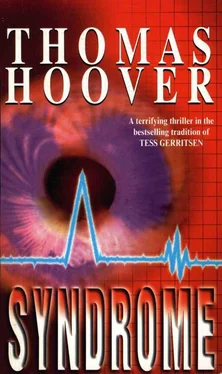Thomas Hoover - Syndrome
Здесь есть возможность читать онлайн «Thomas Hoover - Syndrome» весь текст электронной книги совершенно бесплатно (целиком полную версию без сокращений). В некоторых случаях можно слушать аудио, скачать через торрент в формате fb2 и присутствует краткое содержание. Жанр: Триллер, на английском языке. Описание произведения, (предисловие) а так же отзывы посетителей доступны на портале библиотеки ЛибКат.
- Название:Syndrome
- Автор:
- Жанр:
- Год:неизвестен
- ISBN:нет данных
- Рейтинг книги:4 / 5. Голосов: 1
-
Избранное:Добавить в избранное
- Отзывы:
-
Ваша оценка:
- 80
- 1
- 2
- 3
- 4
- 5
Syndrome: краткое содержание, описание и аннотация
Предлагаем к чтению аннотацию, описание, краткое содержание или предисловие (зависит от того, что написал сам автор книги «Syndrome»). Если вы не нашли необходимую информацию о книге — напишите в комментариях, мы постараемся отыскать её.
Syndrome — читать онлайн бесплатно полную книгу (весь текст) целиком
Ниже представлен текст книги, разбитый по страницам. Система сохранения места последней прочитанной страницы, позволяет с удобством читать онлайн бесплатно книгу «Syndrome», без необходимости каждый раз заново искать на чём Вы остановились. Поставьте закладку, и сможете в любой момент перейти на страницу, на которой закончили чтение.
Интервал:
Закладка:
"Just her mother, Katherine, who's getting pretty frantic."
"The woman is unbalanced. Certifiable. God help us if-"
"I told her to see what she could find out from Kristen's publicist."
"Good." Bartlett had told Kristen's midtown publicity agent, the nosy Arlene of Guys and Dolls, Inc., that Kristen had gone to a private spa in New Mexico to rethink her career and didn't want to be disturbed. She desired complete solitude. Any communication with her would have to be handled through his office.
He looked at Van de Vliet. "Karl, tell me how bad it is for me now."
"For you?" He hesitated. This was the question he'd been dreading. "The telomerase numbers from yesterday's blood sample are not encouraging. As I told you, your topical enzyme application has metastasized into your bloodstream and started to replicate, just like it did in Kristen. We're seeing a process known as 'engraftment.' These special cells have learned to mimic any cell they come near. They become the tissue that those cells comprise and begin replacing the healthy tissue with new. In Kristen's case, we think it's now entered her brain and it seems to be supplanting her memory tissue with blanks. The same side effect could eventually evolve in you."
That doesn't begin to describe the real horror , Bartlett thought. It's too impossible to imagine.
"The only thing left is to find some way to cause your body to reject the enzyme," Van de Vliet said. "I'm optimistic that we might be able to grow some telomerase antibodies in another patient with your blood type, then culture enough of them to stop the Syndrome in its tracks. It's worth a try. Frankly, I can't think of anything else. But your blood type is AB, which is extremely rare. Also, the problem is that we'd possibly be putting that other person at severe risk too."
"Let's go back up to the lab," Bartlett said. "That idea of yours-Hampton thinks he's got somebody. A woman, in her late thirties." He put his hand on Van de Vliet's shoulder. "We're going to get her on board however we have to."
Chapter 3
Sunday, April 5
8:49a.m.
Stone Aimes was staring at the e-mail on the screen of his Compaq Armada and feeling an intense urge to put his fist through its twisted spiral crystals. What do you do when you've come up with an idea that could possibly save thousands of lives using simple Web-based technology and then the piece gets spiked by your newspaper's owners at the very last minute because it exposes some important New York hospitals to unpleasant (but constructive) scrutiny?
What it makes you want to do is tell everybody down on the third floor to stuff it and walk out and finish your book- undistracted by corporate ass-covering BS … or, unfortunately, by a paycheck.
Around him the newsroom of the New York Sentinel , a weekly newspaper positioned editorially somewhere between the late, lamented New York Observer and the Village Voice , was in final Sunday countdown, with the Monday edition about to be put to bed. The technology was state of the art, and the room flickered with computer screens, blue pages that gave the tan walls an eerie cast. Composition, spell-checking, everything, was done by thinking machines, and the reporters, thirteen on this floor, were mostly in their late twenties and early thirties and universally underpaid.
The early morning room was bustling, though it felt to Stone like the end of time. Nobody was paying any attention to him but that was normal: everybody was doing their own thing. Besides, nobody else realized he'd just had a major piece killed at the last minute. Now he felt as though he were frozen in place: in this room, in this job, in this life.
The book he had almost finished was going to change a lot of things. It would be the first major explication of stem cell technology for general readers. Stem cells were going to revolutionize everything we knew about medicine and the research was going further than anyone could have dreamed. The possibility of reversing organ degeneration, even extending life, was hovering right out there, just at humankind's fingertips. It cried out for a major book.
He had read everything that had made its way into the medical journals, but the study that was furthest along was privately funded and now cloaked in secrecy. It was at the Gerex Corporation, whose head researcher was a Dutch genius named Karl Van de Vliet. The company had been bankrolled by the medical mogul Winston Bartlett after Van de Vliet lost his funding at Stanford.
Winston Bartlett , of all people. . but that was another story.
Thirteen months earlier, the Gerex Corporation had trolled for volunteers on the National Institutes of Health Web site, referring to a pending "special study." The notice suggested the study might be using stem cell technology in some fashion. If that study was what Stone Aimes thought it was, it would be the first to use stem cells in stage-three clinical trials. Nobody else was even close.
Karl Van de Vliet was the ball game. Unfortunately, however, his study was being held in an atmosphere of military-like secrecy. Why? Even the identities of the participants in the trials were like a state secret. Since Winston Bartlett owned Gerex, it surely had been ordered by him. You had to wonder what that was all about.
Whatever the reason, Stone Aimes knew that in order to finish his book with the latest information he had to get to Van de Vliet. But Bartlett had forbidden any interviews, and Gerex's clinic, called the Dorian Institute, was off-limits to the public and reportedly guarded with serious security.
But, he thought, perhaps he had just come up with an idea of how to get around that. ..
He stared a moment longer at the dim reflection coming back at him from the antiglare screen, which now informed him that his cover feature had been chopped. Truthfully, it was happening more and more; this was the third time in eight months that a major muckraking piece had been axed. Also, as he stared at it, the reflection told him he wasn't getting any younger. The hairline was no longer where it had been in his college photos-it was up about half an inch-and the blue eyes were sadder, the lines under them deeper.
Still, the tousled brown hair was thick enough, the brow mostly wrinkle-free, and he still had hope. He wasn't exactly young anymore, but neither was he "getting on." The "Willy Loman" years remained safely at bay. He was thirty-nine and divorced, with an ex-wife, Joyce, who had departed to be a garden designer in northern California, taking with her their daughter, Amy, on whom he doted. He had a one-bedroom, rent-controlled apartment in the East Nineties, on the top floor of a fashionable brownstone. He was socially unattached, as the expression goes, but he was so compulsive about finishing the book that he spent weekends hunched over his IBM Aptiva, nursing a six-pack of Brooklyn Lager and writing deathless prose. The truth was he was lonely, but he didn't allow himself to think about it.
He'd always vowed he'd amount to something by forty. And now it was as much for Amy as for himself. She lived with his ex-wife near El Cerrito, California, and she meant the world to him. The mortifying part was, he was a week behind with this month's support check. And he knew Joyce needed the money. It made him feel like a callous deadbeat dad when the real culprit was an unlucky confluence of inescapable bills. He’d make it up next week, but he’d sworn he would never let this happen.
That was why he had a larger game plan. Get out of this frigging day job and finish the book. The time for that plan to kick in was approaching at warp speed. This last insult was surely God's not-so-subtle way of informing him that his future was in the freelance world. Every day out there would be a gamble, but he could write anything he damn well pleased.
Читать дальшеИнтервал:
Закладка:
Похожие книги на «Syndrome»
Представляем Вашему вниманию похожие книги на «Syndrome» списком для выбора. Мы отобрали схожую по названию и смыслу литературу в надежде предоставить читателям больше вариантов отыскать новые, интересные, ещё непрочитанные произведения.
Обсуждение, отзывы о книге «Syndrome» и просто собственные мнения читателей. Оставьте ваши комментарии, напишите, что Вы думаете о произведении, его смысле или главных героях. Укажите что конкретно понравилось, а что нет, и почему Вы так считаете.












